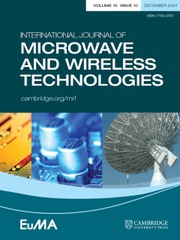Crossref Citations
This article has been cited by the following publications. This list is generated based on data provided by
Crossref.
Prasetiadi, A. E.
Rahmawati, S.
Weickhmann, C.
Nickel, M.
Jost, M.
Franke, T.
Hu, W.
Maune, H.
and
Jakoby, R.
2016.
Electrical biasing scheme for Liquid-Crystal-based tunable Substrate Integrated Waveguide structures.
p.
136.
Che, Bang-Jun
Jin, Tao
Erni, Daniel
Meng, Fan-Yi
Lyu, Yue-Long
and
Wu, Qun
2017.
Electrically Controllable Composite Right/Left-Handed Leaky-Wave Antenna Using Liquid Crystals in PCB Technology.
IEEE Transactions on Components, Packaging and Manufacturing Technology,
Vol. 7,
Issue. 8,
p.
1331.
Al-Saedi, Hussam
Abdel-Wahab, Wael M.
Gigoyan, Suren
Taeb, Aidin
and
Safavi-Naeini, Safieddin
2018.
A low-cost wideband phase shifter for two-way mm-wave phased array antenna system.
International Journal of Microwave and Wireless Technologies,
Vol. 10,
Issue. 1,
p.
77.
Prasetiadi, Ananto E.
Jost, Matthias
Schulz, Baerbel
Quibeldey, Matthias
Rabe, Torsten
Follmann, Ruediger
and
Jakoby, Rolf
2018.
Liquid-crystal-based amplitude tuner and tunable SIW filter fabricated in LTCC technology.
International Journal of Microwave and Wireless Technologies,
Vol. 10,
Issue. 5-6,
p.
674.
Ding, Chang
Meng, Fan-Yi
Mu, Hui-Lin
Han, Jian-Qiao
Zhao, Chuan-Hong
Fang, Qing-Yuan
and
Wu, Qun
2019.
Design of filtering tunable liquid crystal phase shifter based on coplanar waveguide and split-ring resonators.
Liquid Crystals,
Vol. 46,
Issue. 15,
p.
2127.
Ding, Chang
Meng, Fan-Yi
Mu, Hui-Lin
Lv, Jian-Feng
Liu, Yu-Hang
Fang, Qing-Yuan
Xu, Shan-Shan
and
Wu, Qun
2019.
Bifunctional co-design of liquid crystal phase shifter and band-stop filter.
Journal of Physics D: Applied Physics,
Vol. 52,
Issue. 41,
p.
415002.
Ding, Chang
Meng, Fan-Yi
Han, Jian-Qiao
Mu, Hui-Lin
Fang, Qing-Yuan
and
Wu, Qun
2019.
Design of Filtering Tunable Liquid Crystal Phase Shifter Based on Spoof Surface Plasmon Polaritons in PCB Technology.
IEEE Transactions on Components, Packaging and Manufacturing Technology,
Vol. 9,
Issue. 12,
p.
2418.
Zografopoulos, Dimitrios C.
Ferraro, Antonio
and
Beccherelli, Romeo
2019.
Liquid‐Crystal High‐Frequency Microwave Technology: Materials and Characterization.
Advanced Materials Technologies,
Vol. 4,
Issue. 2,
Safavi-Naeini, Safieddin
and
Slekys, Arunas G.
2020.
Handbook of Small Satellites.
p.
1.
Jakoby, Rolf
Gaebler, Alexander
and
Weickhmann, Christian
2020.
Microwave Liquid Crystal Enabling Technology for Electronically Steerable Antennas in SATCOM and 5G Millimeter-Wave Systems.
Crystals,
Vol. 10,
Issue. 6,
p.
514.
Safavi-Naeini, Safieddin
and
Slekys, Arunas G.
2020.
Handbook of Small Satellites.
p.
527.
Jakoby, Rolf
Jost, Matthias
Karabey, Onur Hamza
Maune, Holger
Nickel, Matthias
Polat, Ersin
Reese, Roland
Tesmer, Henning
and
Weickhmann, Christian
2022.
Reconfigurable Circuits and Technologies for Smart Millimeter-Wave Systems.
p.
265.
Ma, Junseok
Choi, Jinyoung
Park, Sungeun
Kong, Imbo
Kim, Daehyeon
Lee, Cheonga
Youn, Youngno
Hwang, Myeonggin
Oh, Seungwon
Hong, Wonbin
and
Kim, Wooksung
2023.
Liquid Crystals for Advanced Smart Devices with Microwave and Millimeter‐Wave Applications: Recent Progress for Next‐Generation Communications.
Advanced Materials,
Vol. 35,
Issue. 45,
Shin, Hyun-Ji
Ma, Jun-Seok
Choi, Jin-Young
and
Kim, Wook-Sung
2023.
Phase Shifting Enhancement of a Substrate-Integrated Waveguide Phase Shifter Based on Liquid Crystal.
Applied Sciences,
Vol. 13,
Issue. 4,
p.
2504.
Alkaraki, Shaker
Qu, Zhishu
and
Kelly, James R.
2024.
mm-Wave Low Insertion Loss SIW Phase Shifter Based on Liquid Metal Technology.
IEEE Microwave and Wireless Technology Letters,
Vol. 34,
Issue. 2,
p.
155.
Qing, Anyong
Zhao, Yizhe
and
Zhang, Zhiyong
2024.
Microwaves, Millimeter Wave and Terahertz Liquid Crystals.
p.
95.


